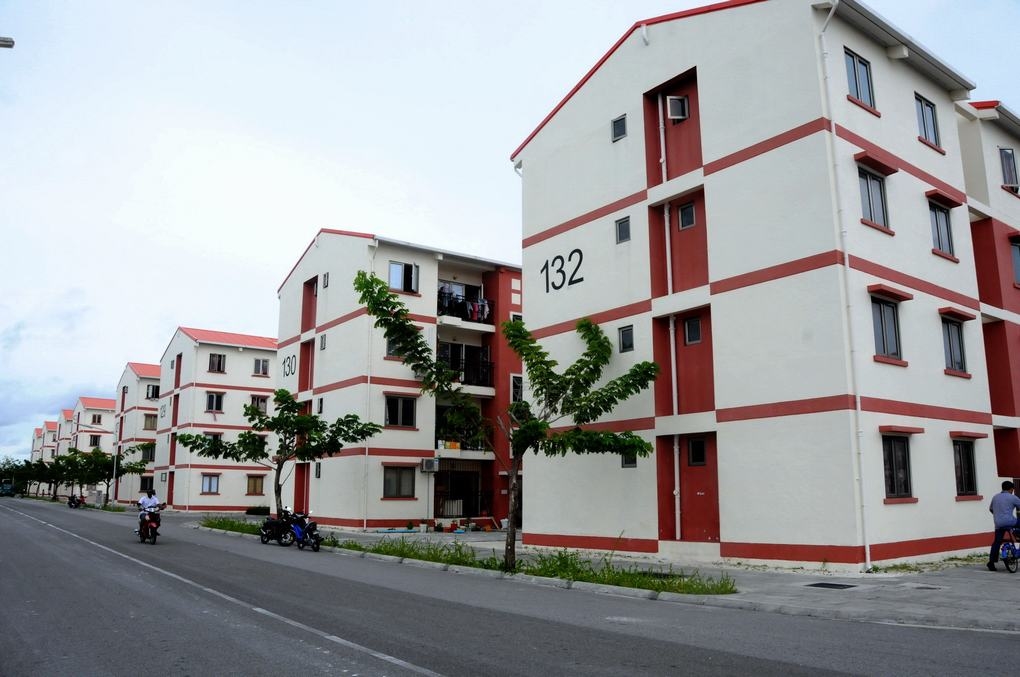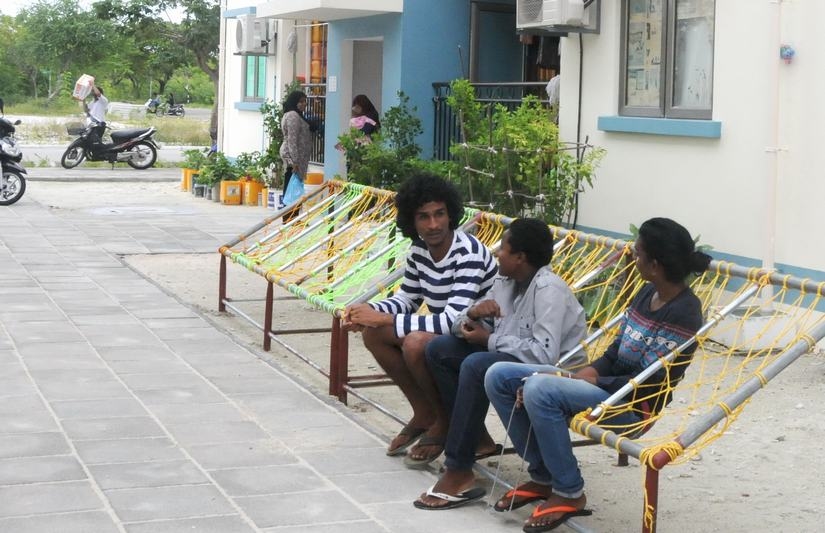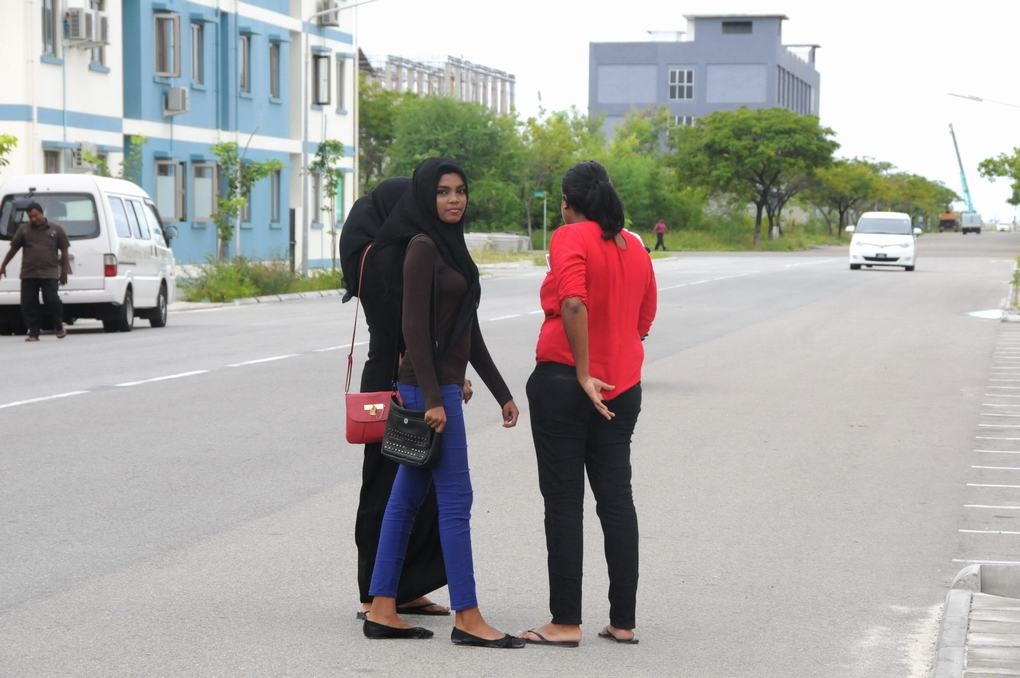“China Town” Realizes Maldivian People’s Dream of House
Yang Meiju and Huang Haimin of Asia Pacific Daily (APD) from Male on August 11: The Maldives is very famous in China because its beautiful sea and sky make it the perfect destination for a honeymoon. In Maldives, on the other hand, China stands for a large number of tourists, tourism income and top market. These two countries that are geographically far apart from each other seem to become increasingly closer. Even so, very few Chinese know that there is a “China Town” in Maldives, which is closely related with the Maldivian people’s dream of house.

Chinese-style residential buildings in China Town. Photo: Huang Haimin, APD journalist
Are you going to China Town?
When the car was driving on the Hulhumale Island, the second largest island on Maldives, the driver, a Maldivian, suddenly asked “Are you going to China Town?” The Chinese boy in the car, who was in a daze, couldn’t believe his ears. He sat up and asked the driver, “what did you just say?” “China Town, are you going to China Town?” the driver repeated.
Liu Jingwen, site manager of CMEC’s housing project in Maldives, can still remember every detail of that dialogue today. The word “China Town” sounded so strange yet so familiar at that moment. It was three months from now in October 2013, when CMEC’s housing project of 1,000 apartments in Maldives were completed and ushered in the first resident. It was also at that moment that Liu Jingwen, who had worked in the construction of this housing project since 2010, heard for the first time that the community was called “China Town” by the locals.
The “China Town” referred to by the locals is the housing project where the “No.135 building” is located, which is the destination Liu Jingwen told the driver the minute he got on the car. Undertaken by CMEC with preferential loan from the Chinese government, the project covers a total land area of 39,600 square meters and consists of 56 buildings of 1,000 apartments in total. It is the largest civilian housing project in the history of Maldives and also the first commercial cooperation project undertaken by a Chinese enterprise in the country.
Compared with “China Town” in other countries, the one in Maldives is special in that all the residents in this China-made residential community are Maldivian locals.

Residents in China Town. Photo: Huang Haimin, APD journalist
A real community
It takes only more than 10 minutes by boat from the Male Island, the capital, to the Hulhumale Island connected with the airport. Created by reclaiming land from the sea in 1997, this 2-square-kilometer island serves as a satellite island to directly alleviate the Male Island of its consistent residential pressure. With 100,000 people living in an area of 1.87 square kilometers, Male Island is the most crowded capital in the world and accommodates 1/3 of the population in Maldives.
If you tell the driver “China Town”, you will be approaching the buildings in about 10 minutes. With distinct Chinese architectural characteristics, these residential buildings are tidy, simplistic and moderate in color with broad roads, echoing perfectly with the blue sky and white clouds of Maldives.

A Muslim woman in China town holding her child is curiously watching the Chinese journalist. Photo: Huang Haimin, APD journalist
When we entered Hussein’s apartment on the first floor, the Ramadan supper that’s being prepared gave off strong curry fragrance. Hussein’s wife Zoyna happily took us to visit every room. With a total area of 76 square meters and consisting of three bedrooms and a living room, the apartment looks very much like a simplistic small-scale apartment in China, with every inch of space fully utilized. The main bedroom is very sweet, while the three children share the children’s bedroom with two bunk beds. Zoyna said that they have to prepare the other room for their older daughter. “The children have their own space to play and rest. Every apartment has a balcony, and there is a garden in the community. This is a real community,” said she.
Indeed the quiet and pleasant China Town offers them a completely different life. While women sit on the mesh chairs in the community, children can play around and enjoy themselves. This is almost impossible on the Male Island that’s only 10 minutes away by boat, where the buildings are tall and narrow, the streets are just wide enough for one car without room even for pedestrian, and children have to stay at home most of the time because the city is too crowded for them to run around.
“Before we applied for this apartment, the five people in our family live in a 30-square-meter apartment with only one room,” said Zoyna. After they moved here, their relatives and friends all envied them, and her sister and parents are planning to move to China Town too.
According to statistics, there were only over 10,000 people on the Hulhumale Island before this housing project started, but now the number has doubled to about 20,000 people. Mr. Wang, the legal representative of the housing project, told the journalist that the 1,000 apartments provide residence for presumably nearly 7,000 Maldivians. When all three phases of the project are completed, the 4,000 apartments in total will solve the housing problem for nearly 30,000 people, which means 1/10 of the Maldivian population will live in “China Town”.
In the near future, the Maldives housing project Phase II will build 1,500 apartments on 9 islands, which is quite difficult because the 9 islands span across 400 kilometers from south to north. As a matter of fact, it is a huge challenge to conduct infrastructure project in Maldives, which is known as the “heaven for tourists and hell for workers”. Liu Jingwen, who has participated in the housing project construction from the very beginning, told the journalist that they have encountered a series of problems when implementing the housing project in Maldives, such as high temperature, damp heat, epidemic, shortage of vegetable supply, boring spare time, religious issue and the long distance from homeland and family. During the nearly four years of project construction, everyone on the site has to work under the high temperature of 40℃ every day and suffer the mosquito and insect bite as well as the dengue hit. However, they also have the privilege of seeing with their own eyes when the buildings rise up one after another, residents move into new apartments successively, and especially hearing the Maldivians calling this residential community the “China Town”. “Hearing those words, we feel that every drop of our sweat is totally worthwhile,” said Liu Jingwen.

Several young women coming home from work are loitering on the wide road of China Town. Photo: Huang Haimin, APD journalist
The dream of house
Luxury, sweetness and space are the vacation experience that Maldives has been promoting to the world. When you go on vacation here, it’s only you between the sea and the sky. But people who have been to the Male Island, the capital of Maldives, will soon realize what a luxury space is for the Maldivian locals. On this island, the street is so narrow that drivers have to put away the rear-view mirror when driving on the street, otherwise the mirror may be bruised. The living environment on other islands than the Male is even worse. Some islands don’t even have access to running water or electricity until recent years.
This is why housing has always been a top priority on the agenda of the Maldivian government in recent years. As one of the “five commitments” made by the Maldivian government to benefit the people, the housing project of 1,000 apartments with preferential loan from the Chinese government started construction at the end of 2010. When completed, the apartments will be provided to residents in the form of affordable housing.
However, it’s very difficult to apply for such an apartment because the Maldivian government has set strict restrictions on the applicants’ qualification. They shall have no apartment under their name, have steady income to pay for the mortgage, specify the number of people to live in the apartment, submit the application form and take part in the lottery. Zoyna told the journalist that they submitted the application form one year and a half in advance and waited for a long time. After they were selected through the lottery, they had to go through round after round of strict inspection. So when they were eventually informed that they were qualified to buy this apartment, the whole family was over the moon.
According to Mr. Wang, 20,000 application forms were received for the 1,000 apartments, so the Hussein family was really lucky. Sitting in his own living room and watching the kids come in and out, Hussein told the journalist that everybody knows this is “China Town”, a name given by the Maldivians. They are very grateful to China for building this project, and they are happy to call it the “China Town”.
Hussein is also concerned with the relations between Maldives and China, and even mentioned the upcoming visit to China by the Maldivian President Abdulla Yameen in August. “The relations between us are getting better, and more and more Chinese people and capital are coming here. I hope our president can receive more support from the Chinese government during his visit to China, such as the cross-sea bridge that is being planned to connect the capital Male and the island of the airport,” said Hussein.
According to Wang Fukang, Chinese ambassador to Maldives, China has provided Maldives with all kinds of assistance in the past more than 40 years, and the China-aided projects are focused on infrastructure construction and people’s livelihood in light of the characteristics of the country. For instance, the preferential loan provided by China to implement the 1,000-apartment housing project in Maldives is to help it realize sustainable economic development. It is known to all that Male is one of the most crowded capitals in the world. When the Maldivian government sold the 1,000 apartments, nearly 20,000 applications were received, far outnumbering the supply.
As the housing project can attract quite a number of people to move out of Male and is of great significance for alleviating the congestion in Male and improving the residents’ living conditions, it is very popular among the Maldivians and is friendly called the “China Town” by local people. Based on the actual needs of Maldives, the governments of the two countries agreed that China will continue to provide preferential loan to implement a phase-II project of 1,500 apartments across Maldives.
Wang Fukang emphasized that in the future, China and Maldives can focus on pragmatic cooperation in such fields as tourism, infrastructure construction and ocean, with the aim to push the bilateral mutually beneficial and pragmatic cooperation to a new level.





